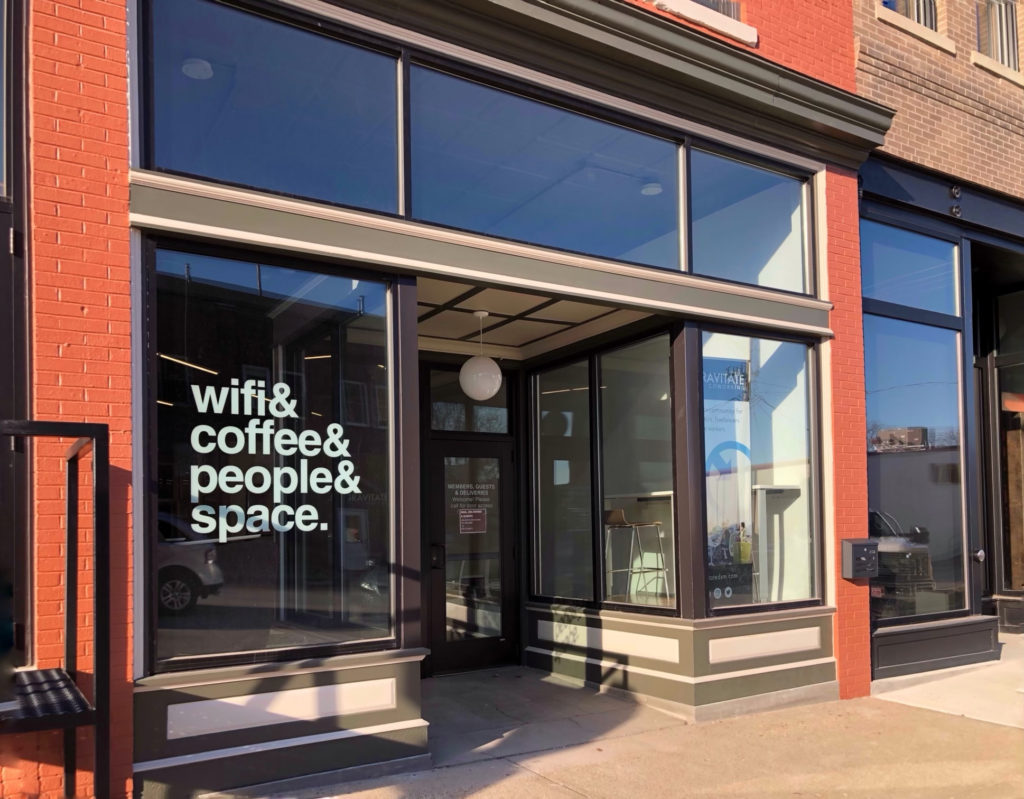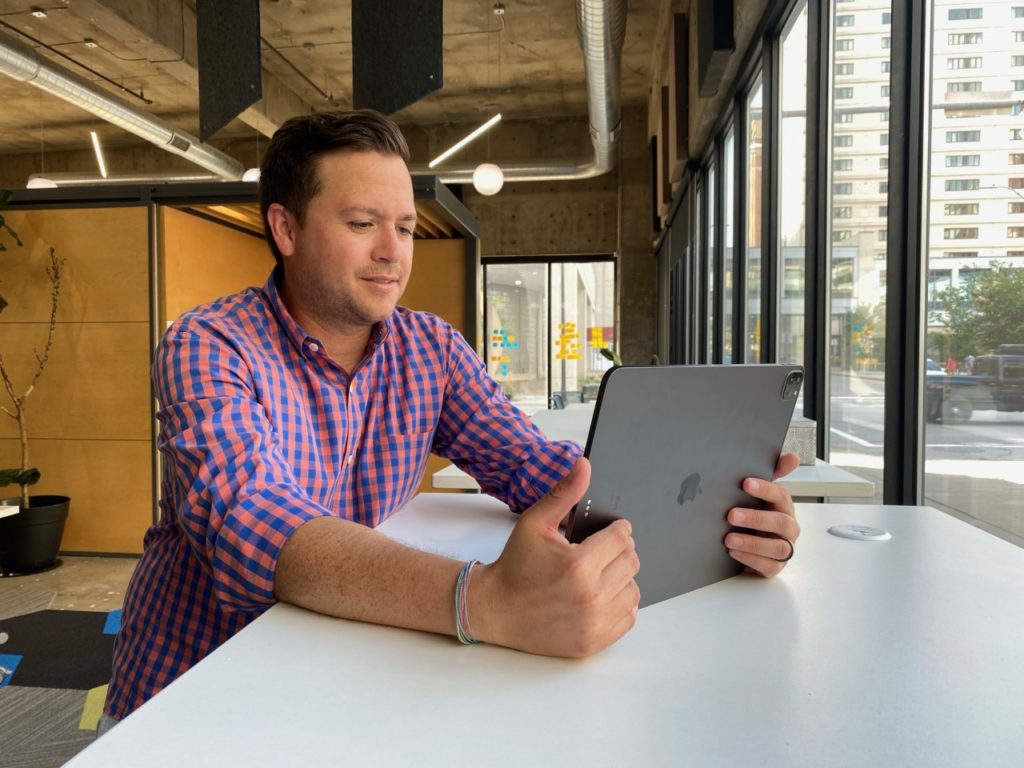
Like nearly all offices, Gravitate Coworking was quiet throughout 2020 as many worked from home. While its two locations never closed last year and precautions were in place, visitors to the space remained slim.
But since the vaccine for COVID-19 became available, numbers have steadily returned to normal levels, and founder Geoff Wood said this summer brought a particular spurt of activity.
“Starting June 1, I don’t know if that was summertime or school’s out or just the Memorial Day holiday, but we have really had people take off, ” Wood said.
The pandemic was a crash course introduction to remote work for many, but more than a year since the switch, coworking spaces are positioned to be part of the future office landscape.
“I think there’s a need for coworking probably in every community, and I would have said that pre-pandemic,” Wood said. “Wherever we are now, mid-pandemic, post-pandemic, I think the need is greater as we’ve had more people embrace remote working [and] there are companies that never thought they would be remote working — it is just a fact of life [now].”
The continued spread of the delta variant of COVID-19 is another reality businesses face. As users return, Gravitate is continuing to follow guidance on safety guidelines, although Wood said state-issued rulings have been “few and far between.” Users are encouraged to wear masks and get vaccinated.
In addition to an influx of newcomers to the two metro locations, Gravitate expanded operations outside Des Moines with two new locations in 2021 — one in Cedar Falls, and its first rural location in Jefferson.
Bringing a coworking space to a rural area of the state was made possible by Chris Deal, who is originally from Jefferson. Since moving back to the community northwest of Des Moines in 2016, he has been striving to set it on a course for change.
“The big picture was what can we do to make a model rural community, a rural community that’s thriving, a rural community that is an example for other rural communities and ultimately a rural community that is poised to move into a growth mode,” Deal said.
A series of projects ensued, including the effort to bring a coworking space to the area. Deal contacted Wood in 2017 to start the first of many conversations about expanding Gravitate.
When the idea was introduced to Jefferson residents, there was an enthusiastic and resounding response.
The coworking space could serve remote workers, current or new business owners looking for space, and those interested in entrepreneurship. Deal said it was the opportunity to live and raise a family in a smaller town while working elsewhere that helped generate a strong interest in coworking.
The community’s excitement also appealed to Wood. He said expansion of Gravitate needs to stem from an interest among residents and relationships with “strong local partners” like Deal, who was also innovating in the community through other projects.
“We were interested in Jefferson when that call came because I think that community has been really forward thinking in what they do as a small town in Iowa,” Wood said. “They’re not resting at all on their laurels as many small communities could. They’re really saying, ‘How do we see the future of what small town Iowa looks like?’”
With a launch early this year, Wood said the startup and entrepreneurial community in Jefferson is just starting to take shape as business picks up.
Deal said he sees startups innovating in the agriculture sector and hopes that if the pandemic wanes Gravitate will be a resource that fosters opportunity for everyone interested in startups and entrepreneurship.
“We want to create a community where someone who comes to the community is going to have every opportunity, I think more opportunities, because they’ve chosen to live and start a business or to raise a family in Jefferson, and Gravitate is a huge part of that,” Deal said. “We think we’re creating a really special community that gives people so many more opportunities than they might have in a different community, and that’s the exact opposite of what rural has been for so long.”
Local mental health startup Sevelyn seeks global impact

With expansions across the state and bringing in new users, founder Geoff Wood said Gravitate Coworking still hasn’t been as busy in its whole existence than it has been in the last two weeks as the Techstars Iowa Accelerator began running its summer accelerator program out of the Gravitate location downtown.
Carlos Argüello is busy as well, between running Sevelyn, his mental health startup, and participating in Techstars Iowa’s 90-day accelerator program. But it’s what he has always done.
Born in Nicaragua, his family immigrated to California, where he started his venture into entrepreneurship by making extra money washing cars or windows at their apartment complex.
At 14 years old and after a move to Carroll, Iowa, Argüello went a step further developing a side business providing translation services for clients. In college, he expanded the business and helped his mother, a journalist, start a Spanish-language newspaper called La Prenza for Iowa’s growing Latino population.
Argüello did not know at the time that years later he would be building another business to help Latinos and other communities who do not speak English.
He started Sevelyn with the goal of bringing on-demand healthcare to patients regardless of insurance coverage or a language barrier. At first Argüello focused on providing primary care, but with too many logistics to navigate as a startup, he pivoted to mental health.
Early customer discovery interviews revealed that Latino people mentioned struggling to gain access to mental health care specifically. Argüello said there is a shortage of psychologists overall, but even more so among foreign language speakers — fewer than 5 percent speak a second language.
“I started connecting the dots to say Latinos who have mental health needs, Latinos who are bypassing the taboos and stigmas who are looking to get help, even if they go out and get help, even if they can go out and afford the higher ticket of psychology, even if they would potentially have insurance, they still can’t get access because we just don’t have the supply,” Argüello said. “So then I said, OK, that’s a problem. That’s a big problem.”
Currently, Sevelyn connects Latinos in the U.S. with Spanish-speaking providers in Latin American countries, who can also relate to cultural pressure and stigma around mental health. Patients will also have the peace of mind that Sevelyn vets providers and ensures they are qualified and following HIPPA standards. Services are also provided at a fixed rate of $50 per session.
Argüello said he started Sevelyn focusing on Latinos because they are a main source of population growth in Iowa, but it is his intention to expand the startup to provide services for people who speak any language.
“We feel that these folks want that trust in that cultural competency from their providers that are most likely going to be people who are back home or understand them as a culture, their language, maybe are even from their home country,” he said.
Argüello is confident that scaling Sevelyn to a national and global level will be possible with the help of Techstars Iowa. He said it has been a “whirlwind” experience as he didn’t know he was joining the 2021 cohort until the weekend before the accelerator program began a few weeks ago.
Sevelyn was pre-revenue until that weekend, and needed to show that the company had traction before joining Techstars. He was tasked with getting as many customers over the weekend as possible, and went from zero to 23 patients by Monday.
Now that Sevelyn is officially a member of the accelerator program, Argüello will be off to the races for the next 90 days working to grow Sevelyn and to connect “as many patients with as many therapists as possible.”
“Having a spotlight around Techstars will accelerate the business to get me on a platform that allows us to put Sevelyn and the things that we do in a better light and stage than we could have done by ourselves, because this [idea] has global reach, has national reach,” he said.
Although Sevelyn is a business looking to make profit, Argüello emphasizes that it is mission-driven and was happy to see that Techstars was welcoming to that approach.
“To see that these types of companies are welcome in accelerators like this, it was great. And to be able to see that they understood our path and our mission to be a great startup but with a social impact component, that was great for us,” he said.
After the conclusion of the accelerator program, Sevelyn is looking to connect with any community, agency or other entity that has a role in caring for mental wellbeing.
Argüello said he is also planning a national launch of Sevelyn in early 2022. His long-term goals include introducing more technology that will help providers and patients better understand and maintain mental wellbeing as well as a non-profit foundation that allows patients to receive treatment no matter their ability to pay.